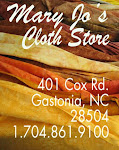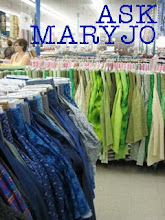
Last week the Gaston Gazette featured an article about Mary Jo, her Cloth Store and the passion she has for her store. We also received a letter from one of our longtime fabric manufacturers, praising Mary Jo. Mary Jo mentions designing some of his fabric in the article.
The Letter From a Long time Fan...Please let Mary Jo how much we enjoyed the article in the Gaston Gazette.
It does allude to but does not explain how "special " Mary Jo and Mary Jo's is to all in our business. Having had the distinct pleasure and honor of knowing and working with her for over 20 years being one of those who listened to her directions (see outhouses and much more) words can not express what she means to me and I presume many others.
 Mary Jo congratulations, it is not everyday that one gets to work with a TRUE ICONIC person in an industry.
Mary Jo congratulations, it is not everyday that one gets to work with a TRUE ICONIC person in an industry.
God Bless Mary Jo and all those are lucky enough to cross her path.
Richard Cohn
Richard owns Elizabeth Studios and designs some of the prettiest fabric. Oh, you are a dear to remember such sweet things. Gaston Gazette article...
Still Gaston County’s Fabric QueenBY RAGAN ROBINSON
Mary Jo’s Cloth Store outfits the milestones that bookend lives. Starched white christening gowns. Sequined dance costumes. Glitzy wedding dresses. Millions begin here.
During six decades in business, the fabric mavens of Mary Jo’s have unfurled miles of stiff cotton and supple corduroy, intricate lace and iridescent taffeta.
In the middle of it all last week, sisters Joyce Mahaffee of Gastonia and Rebecca Jolley of Forest City scrutinized a bolt of quilted blue cloth. Jolley had a pattern in tow for a cushioned seat to fit inside any shopping cart lucky enough to receive her granddaughter.
She met up with Mahaffee for a late afternoon trip to Mary Jo’s because, she says, this is really the only place to buy fabric.It’s where their mother, who drove from Rutherford County to the former Dallas shop, came for the blue and pink material that adorned their bridesmaids.
It’s where the polyester originated for the side zip bell bottoms Mahaffee loved as a teenager. And it’s where she still goes when she needs burlap for table-scapes.
The cloth store has 32,000 square feet of retail space. That doesn’t include the top floor, where metal shelves are stacked with back-up stock and every alcove glitters with beads or buttons or bobbins of fancy trim. “You just always say if you can’t find it at Mary Jo’s, you can’t find it anywhere,” Mahaffee says.
Sewing’s siren song-
Mary Jo’s celebrated its 60th anniversary Jan. 16. The shop’s namesake, Mary Jo Cloninger, opened her first store on her 19th birthday in 1951. A rented space in the back of her father’s barber shop, it was smaller than the upstairs room where she meets with salesmen today.
Cloninger’s father was a barber, landlord, used-car salesman and all-around small-town businessman in Dallas. His daughter didn’t think she had his entrepreneurial spirit. As a little girl in Dallas, she wanted to be a missionary. Cloninger daydreamed of Africa and spreading the gospel. She would sit with her dad, the church treasurer, and watch as he counted collection money and tithes on Sundays. She learned to keep her mouth shut about who gave how much,even when it was hard.
 Not that Cloninger always followed every rule-
Not that Cloninger always followed every rule-Her mother’s sewing machine was off limits to the little girl. But Cloninger couldn’t resist. Left to babysit her three younger brothers and her baby sister, she would gather cotton scraps and stitch them together. She had to hide the results from her mother. If anyone had ever told, Cloninger knew she’d get a spanking for sure.But there was something, she says, about that sewing machine. She couldn’t keep away.
Choosing her path-By high school, she was expert enough to teach her classmates to sew in their home economics course. But when Cloninger was in 12th grade, she says her father pulled her out of Dallas High School to run the family grocery store. She’d been manning the register since she was tall enough to see over the counter, running straight from school, jumping three steps and getting to work every afternoon. But after managing the store full time for more than a year, she formed a different plan.
Cloninger appealed to her father’s business sense. What if she could sell that grocery store? Could she rent the back of his barber shop for a cloth store instead?
He said, "Well sure, if you can find a buyer you go ahead and sell it," Cloninger remembers.
“I told him I’d already sold it.”
Business grows – and grows-Cloninger opened Mary Jo’s that year and eventually took over the entire building.
She later moved into a different Dallas location — one of two airplane hangar shaped buildings in downtown — and before long took over the neighboring “hangar.” Her parents’ home turned into a warehouse in time. Then Mary Jo’s built a two-story building nearby.
The business moved into its massive Gastonia store in 1986.
In the early years Cloninger drove to Charlotte for wholesale cloth. Or she went to local mills and collected remnants,piling them high in the car and on her children’s laps.
“You couldn’t see anything but their heads,” she says, clapping her seamstress’s hands and tossing back her head in a wide smile of remembrance.
These days the fabric salespeople come to her — and they listen to Cloninger’s expert advice.
She tells them what designs they ought to offer, sketches out illustrations for them on the notepad she keeps handy. More often than not, they come back with the suggested print, says Cindy Gardener, one of 62 Mary Jo’s employees.
One of the samples draws a giddy giggle from Cloninger. Outhouse scenes line the cloth and she points to the feet visible below random doors. That was her idea.
From Gastonia to Hawaii-
Gardener is sure the store has tens of thousands bolts and rolls of fabric. Much of it is discontinued or made by companies long out of business. “If Mary Jo can get her hands on it, chances are she’s going to buy it,” Gardener says. That’s what brought shopper Kitty Kuhr last week.A maker of clown and entertainer costumes, she lives near Raleigh but made the trip to Mary Jo’s because she knows the shop has fabric she won’t find elsewhere.
Cloninger insists her selection is the largest in the United States. It draws shoppers from the entire East Coast and beyond.
International buyers fill wheeled suitcases, she says. Costumers from Wilmington’s film studios come once or twice a year and theater groups are regular customers, according to Thomas Cloninger, who handles much of the business for his mother.
In the webmaster’s office, pins on a world map mark orders from Australia, Africa, the United Kingdom and the Hawaiian Islands.
 Millions of yards to memorize-
Millions of yards to memorize-Mary Jo’s sold 1.2 million yards of cloth last year, Thomas Cloninger says. And still, his mother can offer details on most of it. Her memory, like a favorite handmade nightgown, has faded with time. She has trouble remembering the generations of Halloween costumes and pajamas she stitched together. But the store’s merchandise is a different story.
“What’s that?” she asks, stopping at a roll of unassuming, bottom-shelf beige fleece she doesn’t recognize.
It’s only been here about a week, Gardener assures her. Otherwise Cloninger would have known about it already. Her employees live up to the challenge, too. Marcella Beard has been with Mary Jo’s for 20 years. She’s the person who answers questions about threading sewing machines, picking pillow case fabric, making pastoral robes — almost any query customers can bring. And she can’t be stumped. Where’s the polyester pinstripe? Up front,on the exact table to which she points. Green Bay Packers fabric? A side wall. Any snakeskin? That’s on the animal table (one of several) near the water and fish subsection. A tablecloth? You’ll probably need about 110 inches of special fabric.
 A missionary after all
A missionary after all-
Mary Jo Cloninger still sews a little. And she still keeps her scissors attaches to a belt loop with a piece of elastic. Just like she did as a one-room shop owner, she says she’ll offer advice on putting in zippers, working button holes, making the wedding and the christening and the bridesmaids gowns.
If she can’t help, Cloninger knows she has someone who can.
“I got to be a missionary here,” she says. “I didn’t have to go to Africa.”
Thanks for being longtime customers and faithful readers. We appreciate you. Do you have a story you would like to share?
Send us a few photos and a brief description and you could be our next featured article. Thanks again, Happy Sewing.
 Have you often thought of the many things you could do for others, but haven't stumbled on your exact course of action? We recently received an inspiring letter from a gal who figured out her own special path to giving. She was haunted by the passage in Matthew 25, 36, "I needed clothes and you clothed me".
Have you often thought of the many things you could do for others, but haven't stumbled on your exact course of action? We recently received an inspiring letter from a gal who figured out her own special path to giving. She was haunted by the passage in Matthew 25, 36, "I needed clothes and you clothed me". Although my project seems small, it is my prayer that God will use my dresses to make a precious girl not only feel special, but also feel God's love. Mark 4:20..."Others, like seed sown on good soil, hear the word, accept it, and produce a crop - thirty, sixty, or even a hundred times what is sown." I'd love for this to become much bigger than me and my little Singer sewing machine. God may just make that happen. Thanks for giving me the opportunity to share. Well, the sew must go on, Jennifer Sinclair
Although my project seems small, it is my prayer that God will use my dresses to make a precious girl not only feel special, but also feel God's love. Mark 4:20..."Others, like seed sown on good soil, hear the word, accept it, and produce a crop - thirty, sixty, or even a hundred times what is sown." I'd love for this to become much bigger than me and my little Singer sewing machine. God may just make that happen. Thanks for giving me the opportunity to share. Well, the sew must go on, Jennifer Sinclair Thanks so much for your inspirational story. We hope some of our customers will be inspired to follow their "Giving Path". We have bolts and bolts of the style of fabric Jennifer did choose for her Passion Project. Bright almost retro, yet somewhat modern, this is a sturdy cotton blend with a giant pop of color. What could make a young girl, in any country happier then these sunny dresses. Remember, we also have incredible, beautiful fabric ON SALE in the store and online. Shop the Sale page frequently as the stock is always changing.
Thanks so much for your inspirational story. We hope some of our customers will be inspired to follow their "Giving Path". We have bolts and bolts of the style of fabric Jennifer did choose for her Passion Project. Bright almost retro, yet somewhat modern, this is a sturdy cotton blend with a giant pop of color. What could make a young girl, in any country happier then these sunny dresses. Remember, we also have incredible, beautiful fabric ON SALE in the store and online. Shop the Sale page frequently as the stock is always changing.









